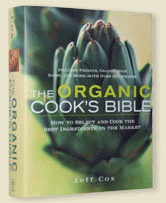Why Buy Organic Food?
Organic Lifestyle Comments Off on Why Buy Organic Food?
If anyone asks you why you buy organic food, or why they should buy organic food, you might want to copy the following and hand it to them.
I buy organic food because:
• It’s often more nutritious and tastes better. Many studies show that organic food can provide up to 30 percent more of some nutritive elements than conventionally farmed food.
• It contains no artificial ingredients like chemical food coloring, texturizers, preservatives, laboratory-made flavors, and so on.
• It’s grown or raised without agricultural chemicals, many of which contaminate conventional food, accumulate in the body, and cause serious illness and disease.
• It is not genetically modified. The GM process creates unnatural plants and animals increasingly suspected of causing serious bodily injury when ingested, among other problems.
• No hormones to stimulate growth or force increased milk production are given to organically raised animals.
• No antibiotics, which hasten the evolution of antibiotic-resistant microbes, are allowed in organic animal husbandry.
• Organic rules insist on the humane treatment of farm animals.
• Organic farming enhances the health of the soil, prevents erosion, protects against drought, and adds life-giving organic matter to the soil even as it’s being farmed.
• Organic farms are about 40 percent more biodiverse than conventional farms. The greater the biodiversity, the healthier the ecosystem.
• Organic farming protects farmers and their families, and farm workers and their families, from contact with toxic agricultural chemicals.
• Organic farms provide safe, non-toxic habitat for wild creatures, from microbes to deer, from fish to birds.
• Organic farming protects lakes and streams from chemical pollution.
***
YOUR COFFEE DOLLARS DEFEAT GMO LABELING
Food Democracy Now has issued the following press release:
With nearly 20,000 retail stores in over 60 countries, Starbucks is the most popular and widespread coffeehouse chain on the planet. In the past decade, Starbucks has paved the way for the modern corporate coffeehouse industry with its alleged commitment to “ethical sourcing” and “sustainability,” and its consistently strong promotional marketing.
Unfortunately, while Starbucks has widely touted “ethical sourcing” and “sustainability” in their marketing material, they’ve failed to live up to those ideals in reality. Right now, Starbucks is serving milk to millions of customers every day from factory farms, along with baked goods full of genetically engineered ingredients.
As if that weren’t bad enough, as a dues paying member of the Grocery Manufacturers Association (GMA), Starbucks has helped lead the charge against openness and transparency in our food system by fighting against common sense GMO labeling in the U.S.
In the past two years, Starbucks has been a part of a GMA-led coalition that has donated more than $70 million dollars to defeat GMO labeling efforts in California and Washington State. During 2012, the GMA donated $2 million to defeat Prop 37 in California and last year, the GMA illegally donated $11 million as a part of a secret slush fund to defeat I-522 in Washington.
Tell Starbucks to stop fighting against GMO labeling and commit to serving the most sustainable dairy option–organic milk–at all of its locations:
http://action.fooddemocracynow.org/go/1227?t=7&akid=1184.101853.pTWO5h
By opposing GMO labeling, Starbucks has willingly climbed in bed with Monsanto and the GMA and is intentionally misleading customers about their commitment to “sustainability” and “ethical sourcing.”
The Starbucks’ company website states: “We have always believed Starbucks can–and should–have a positive impact on the communities we serve. One person, one cup and one neighborhood at a time.”
That sounds great in theory, but what about the fact that Starbucks serves milk for their lattes and cappuccinos from cows on factory farms? We know from living in Iowa that factory farms are not sustainable and don’t have a positive impact on our communities, where they pollute our water supply, degrade our soil, and depopulate rural towns.
And while we’re impressed with Starbucks’ online “Ethical Sourcing” pledge, which states: “We’re committed to offering high-quality, ethically purchased, and responsibly produced products,” we think they fall frighteningly short by selling dairy products from factory farms where animals are fed genetically engineered grains and given sub-therapeutic doses of antibiotics. This is not our idea of sustainable!
At Food Democracy Now! we think that Starbucks could be a force for good and true “ethical sourcing,” instead of promoting industrial agriculture by factory farms and supporting Monsanto’s herbicides and GMOs. In order to do this, Starbucks needs to transition away from the factory farm model and support local, regional and organic dairy farmers.
If Starbucks could commit to that, like they have with sourcing their fair trade coffee, rural America could benefit from a resurgence in small and mid-sized organic dairy farms. Starbucks’ customers can help them lead the way by demanding this important change.
Take the pledge to boycott Starbucks until they stop fighting GMO labeling and start serving local, sustainable organic milk! Tell Starbucks it’s time to get out of bed with Monsanto and start ethically sourcing their dairy products and removing GMOs from their in-store baked goods. Here’s the action website: http://action.fooddemocracynow.org/go/1227?t=10&akid=1184.101853.pTWO5h
It’s time that major companies like Starbucks are held accountable for their unsustainable and unethical choices that conflict with their own marketing hype. We can’t let them get away with it, just because the mainstream media refuses to do its job and report the truth.
***
GMO LABELING BILL MOV ING IN CALIFORNIA SENATE
In 2012, California’s Prop 37 sparked a groundswell of GMO labeling bills in states across the nation. Last year, Connecticut and Maine passed GMO labeling laws, but those laws won’t go into effect until other states pass similar legislation. The Organic Consumers Association wants to make California the first state to pass a GMO labeling bill with no strings attached.
California Senate Bill 1381, which would label genetically engineered foods in the state, was recently passed out of the state Senate Health Committee. The bill now goes back to the Rules Committee and then on to the Senate Judicial and Agriculture Committees, before going to the Senate floor for a vote.
SB 1381 is a simpler, clearer version of Prop 37. Polls, both before and after the 2012 election, showed that 67 percent of Californians support a state GMO labeling law. SB 1381 is a chance to finally achieve what the people of California want: GMO labels on their food. Californians deserve the right to know if food has been genetically engineered, just as citizens do in the 64 countries across the globe that have mandatory GMO labeling rules.
***
PUTTING TWO AND TWO TOGETHER
Let’s put two things together here.
One, income inequality is America is sickening. The top one tenth of one percent have more wealth than the bottom 40 percent of Americans. What we’re talking about is bank accounts worth billions upon billions of dollars. We’re talking about a handful of oligarchs.
Two, the Supreme Court, in its ignorant folly, has ruled that protecting free speech means that these American oligarchs can now back legislators to whatever amount of money they choose over each election cycle.
So here I am, Senator Bunkum or Representative Flunky, spending most of my time on the phone trying to raise money to keep myself in office in the next election, when into my office walks David Koch or Sheldon Adelson or one of their representatives, with an open checkbook and says, “What do you need? A few million? So be it. And in return we’d like you to consider the following pieces of legislation.” Meanwhile, 50,000 of the legislators’ constituents back home are signing petitions urging them to reject the selfsame legislation, but the petitions have no money attached.
What does this mean for the future of America? It means that the top one percent, rich and getting richer, will call the shots. And for whom will they call the shots? Well, let’s see—Paul Ryan’s budget already proposes to cut more food stamp aid, funds for the poor, Medicare and Medicaid. And why? So that the money can flow, as it does in ever-increasing torrents, to the wealthiest among us. And then? The wealthiest will turn the screws ever tighter on the legislators who they are bribing (legally now) to make sure the money spigots open ever wider in their direction, and ever smaller for the rest of us.
The Roberts Court, installed by our country’s own moron, George W. Bush, is carrying out his pro-corporate agenda. This latest decision is beyond sickening. It spells the end of the great experiment in democracy and social justice that was once the United States of America but has now become the suffocating fat asses of the uber-wealthy sitting on top of the people. And the people can’t breathe.
***
BOOKS FOR FOLKS WHO LIKE TO EAT GOOD FOOD
Here are two books that touch upon aspects of home cookery. Just make sure, if you purchase the books, that the ingredients you use to follow the recipes are organic. Then you’ll be able to set a table that’s the envy of the world.
CHARCUTERIA, The Soul of Spain, by Jeffrey Weiss; Surrey Books, Chicago, 2014; 460 pp., $39.95. If you’re up for it, Chef Weiss, who worked for years with top chefs in Spain, will take you step by step into the world of Spanish charcuterie: smoked meats, fermented and spiced meats, sausages, escabeche, and much more. It’s written with the salty language of a line cook, with a passion for the subject, and it will make your mouth water.
SAUCES AND SHAPES: Pasta the Italian Way, by Oretta Zanini De Vita and Maureen B. Fant; W.W. Norton & Co., New York, 2013; 400 pp., $35. Here in America, we love Italian food. Too bad we don’t make it and serve it the way Italians do. What’s needed is a guidebook to real Italian food, just what you’d encounter if you ate at the dinner tables of real Italian families. Well, this book is it. When your friends from Italy come to visit, they’ll be astounded at the authenticity of your food and service.
###












